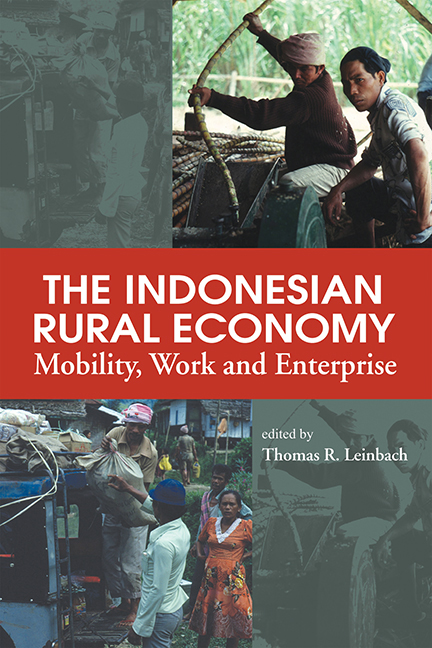Book contents
- Frontmatter
- Content
- List of Tables
- List of Figures
- Contributors
- Acknowledgements
- Glossary
- Foreword
- Part I The Development Context
- Part II Entrepreneurship, Gender and Mobility Issues
- Part III Indonesia's Rural Non-Farm Economy: Case Studies and Policy Development
- Chapter 9 Small Enterprises, Fungibility and South Sumatran Transmigration Livelihood Strategies
- Chapter 10 Transitions to Non-Farm Employment and the Growth of the Rattan Industry: The Example of Desa Buyut, Cirebon
- Chapter 11 Policy Implications for RNFEs: Lessons from the PARUL Project in Indonesia
- Chapter 12 The Indonesian Rural Economy: Insights and Prospects
- Index
Chapter 9 - Small Enterprises, Fungibility and South Sumatran Transmigration Livelihood Strategies
from Part III - Indonesia's Rural Non-Farm Economy: Case Studies and Policy Development
Published online by Cambridge University Press: 21 October 2015
- Frontmatter
- Content
- List of Tables
- List of Figures
- Contributors
- Acknowledgements
- Glossary
- Foreword
- Part I The Development Context
- Part II Entrepreneurship, Gender and Mobility Issues
- Part III Indonesia's Rural Non-Farm Economy: Case Studies and Policy Development
- Chapter 9 Small Enterprises, Fungibility and South Sumatran Transmigration Livelihood Strategies
- Chapter 10 Transitions to Non-Farm Employment and the Growth of the Rattan Industry: The Example of Desa Buyut, Cirebon
- Chapter 11 Policy Implications for RNFEs: Lessons from the PARUL Project in Indonesia
- Chapter 12 The Indonesian Rural Economy: Insights and Prospects
- Index
Summary
Introduction
As the forces of globalization continue to expand and isolation is broken down, new opportunities and forms of employment have become reachable by rural populations. It is almost a truism that the livelihood patterns and strategies of families increasingly assume non-agricultural or non-farm employment. Despite a large literature on the rural non-farm economy there is much we do not know about its characteristics and potential (Saith 1992). One especially critical topic in this perspective is the growth and viability of small enterprises. This chapter examines several aspects of small enterprise development and its employment-generating capabilities in a particular context, Indonesia's transmigration programme, and seeks to link the findings to both the theoretical and empirical literature on the topic (see also Leinbach 2003). In addition it speaks to the latent potential of Indonesia's important but understudied rural non-farm economy.
Objectives
This chapter has several specific objectives. First, a brief review of the rural work, livelihood and enterprise literature is undertaken focusing especially on research in Indonesia. Second, the theoretical context associated with peasant household enterprises and the family mode of production is presented. Third, the patterns of enterprise activities are examined for a sample of families in nine South Sumatran transmigration schemes. Statistical modelling is used to extract generalizations and explain the activities in terms of economic, social and contextual variables. In addition qualitative analyses of business experiences are presented using a case study approach with information derived from several indepth household interviews. In this regard the family mode of production is used as a theoretical tool to gain insight and particularly to expand upon and seek more generalization on Lipton's (1984) defined concept of ‘fungibility’. Overall the ultimate goal is to achieve a deeper understanding of the ways in which small enterprises, including home industries, contribute to family livelihoods.
Rural Work, Livelihoods and Enterprises Literature
The literature on livelihood strategies and rural non-farm activities in the developing world is quite large and there is insufficient space here to give it due justice. Yet it is important to mention noteworthy pieces that are guiding the research effort. In a very general vein there are several recent works, which address the debates on rural development, differentiation, work and livelihoods in a variety of settings.
- Type
- Chapter
- Information
- The Indonesian Rural EconomyMobility, Work and Enterprise, pp. 209 - 243Publisher: ISEAS–Yusof Ishak InstitutePrint publication year: 2003

